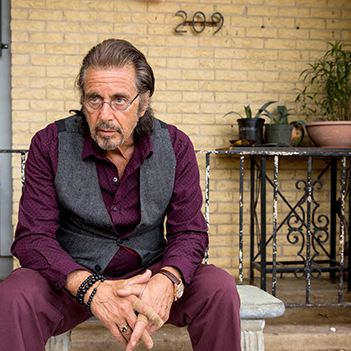
David Gordon Green’s Manglehorn is a character study that starts off pretending to be something else — though I can’t say for sure what that something else is. The character in question is a sad-sack Texas locksmith, played by Al Pacino. He’s got a commodities trader son (Chris Messina) and an ex-wife he claims he never loved. He’s got a granddaughter he adores. He’s got a pimp pal (Harmony Korine!) in a porkpie hat, eager for his business. He’s got a sick, constipated cat, whom he cares for greatly. He’s got a lovely bank teller friend (Holly Hunter) with whom he could pursue something more — but he seems curiously oblivious to her charms. There are many doors, it seems, that he could open and walk through to a better, more fulfilling life. But no. That van he drives around, emblazoned with the words “Manglehorn Lock & Key,” is more than a vehicle — it’s a symbol for the state of his heart.
What Manglehorn does do is spend much of his time writing flowery letters to a long-lost love named Clara. He’s been writing them for years, filling them with painfully romantic pronouncements: “You could’ve saved the world with those eyes. You could’ve stopped evil in its tracks.” And: “You remember how you used to whisper about the future to me, right before we’d fall asleep?” And: “The only thing I want to do anymore is love you. Even hearing those words makes my heart pound.” The letters come back stamped “Return to Sender,” and every day Manglehorn goes to his mailbox, which has a beehive growing right under it (more symbols!), and picks up his daily dose of rejection.
In his very first films, David Gordon Green distinguished himself as the rare Terrence Malick protégé with his own aesthetic and vision: Films like George Washington, All the Real Girls, and The Undertow combined a youthful verve and playfulness with Malick’s ethereal Americana. That feels like ancient history now: The prolific Green has since carved out a surprisingly diverse body of work, with improv pop comedies like Pineapple Express, sturdy adaptations like Snow Angels, and wonderfully evocative doodles like last year’s Prince Avalanche. Yet I can’t help but feel Malick’s influence in Manglehorn’s florid, almost embarrassingly personal letters — in the way they open up the raw, childlike emotions stirring within. But the way Pacino reads the letters is anything but childlike. In voice-over, he speaks in a broken murmur, the voice not of a man in love, but of one drowning in regret.
Manglehorn drifts around a bit before getting to what seems like the heart of the matter — the protagonist’s inability to connect with the world because of the way he’s locked things away inside. He can’t get over Clara, or this idealized vision of Clara he’s created in his head. And as touching as Pacino is here, the film doesn’t truly come alive until Hunter fully enters the picture. A belated, uncomfortable date between the two of them is the high point, both because it features two of our finest actors getting to play off one another, but also because it locks the film and its themes into focus.
Green clearly wants to break free of the typical molds of telling these stories. He experiments stylistically now and then with slow motion, flash-forwards, and elliptical cutting, and you can sense his frustration, his desire to impose some personality over this small slice of life. At the same time, I couldn’t help but wonder if Manglehorn might have been more affecting — leaner, sharper, better able to draw us into its small-scale world — if Green had dispensed with the formal playfulness. There’s a powerful austerity to Manglehorn the man’s tale that Manglehorn the film itself — well acted and touching though it often is — doesn’t quite match.
*A previous version of this review misidentified the DGG film as Underneath, not Undertow.


